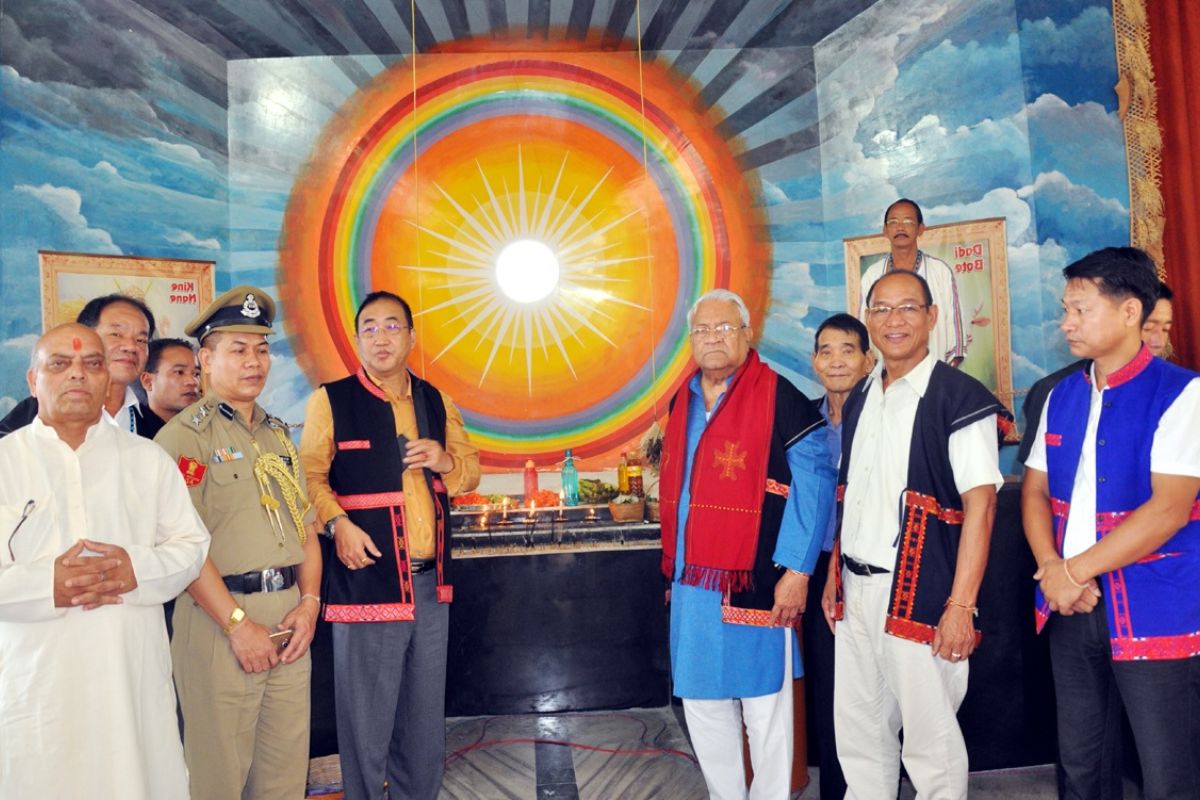
Donyi-Polo is a fascinating belief system practiced by the indigenous people of Arunachal Pradesh in India. Rooted deeply in nature, this faith revolves around the worship of the Sun (Donyi) and the Moon (Polo). Donyi-Polo isn't just a religion; it's a way of life that emphasizes harmony with the environment and respect for all living beings. Followers believe in the presence of spirits in nature, which guide and protect them. This belief system also includes various rituals, festivals, and oral traditions passed down through generations. Curious about how this ancient faith shapes the lives of its followers? Let's dive into 29 intriguing facts about Donyi-Polo that will enlighten you on its rich cultural heritage.
What is Donyi-Polo?
Donyi-Polo is a fascinating indigenous religion practiced by the Tani people of Arunachal Pradesh in India. It revolves around the worship of the Sun (Donyi) and the Moon (Polo). This belief system is rich in traditions, rituals, and cultural significance.
- Donyi-Polo means "Sun-Moon" in the Tani languages.
- The religion emphasizes harmony with nature and respect for all living beings.
- Followers believe that Donyi (the Sun) represents the female principle, while Polo (the Moon) represents the male principle.
- Donyi-Polo is not just a religion but a way of life, deeply ingrained in the daily activities and festivals of the Tani people.
Origins and History
Understanding the origins and history of Donyi-Polo provides insight into its cultural and spiritual significance.
- The religion has been practiced for centuries, long before the advent of major world religions in the region.
- Oral traditions and folklore play a crucial role in preserving the history and teachings of Donyi-Polo.
- The Tani people believe that their ancestors were guided by Donyi and Polo in their migration and settlement in Arunachal Pradesh.
- Historical records suggest that Donyi-Polo was the dominant belief system in the region before the spread of Buddhism and Christianity.
Rituals and Practices
Rituals and practices form the core of Donyi-Polo, reflecting the community's connection with nature and the cosmos.
- Rituals are often conducted by a priest known as a Nyibu or Miri.
- Festivals like Solung, Mopin, and Dree are celebrated with great fervor, involving dances, songs, and feasts.
- Animal sacrifices, particularly of mithun (a type of cattle), are common during major ceremonies.
- The rituals often include offerings of rice, millet, and homemade beer to the deities.
Symbols and Deities
Symbols and deities in Donyi-Polo are rich in meaning and reflect the religion's deep connection with the natural world.
- The Sun and Moon are the primary deities, symbolizing balance and harmony.
- Other important deities include Kine Nane (goddess of crops) and Doying Bote (god of animals).
- The symbol of the Sun is often depicted as a circle with rays, while the Moon is shown as a crescent.
- Sacred groves and altars are common places of worship, often located in natural settings.
Modern-Day Relevance
Despite the influence of other religions, Donyi-Polo continues to thrive and adapt in modern times.
- Efforts are being made to document and preserve the oral traditions and rituals of Donyi-Polo.
- The Donyi-Polo Yelam Kebang, an organization, was established to promote and protect the religion.
- Many young people are showing renewed interest in their cultural heritage and participating in traditional rituals.
- The religion is seen as a symbol of ethnic identity and pride among the Tani people.
Challenges and Preservation
Like many indigenous religions, Donyi-Polo faces challenges but also sees efforts for preservation and revival.
- The spread of Christianity and Buddhism has led to a decline in the number of Donyi-Polo followers.
- Modernization and urbanization pose threats to traditional practices and rituals.
- There are ongoing efforts to include Donyi-Polo teachings in school curriculums to educate the younger generation.
- Cultural festivals and events are organized to showcase and celebrate Donyi-Polo traditions.
Interesting Facts
Here are some intriguing facts that highlight the unique aspects of Donyi-Polo.
- The religion has no written scriptures; all teachings are passed down orally.
- Donyi-Polo followers believe in the concept of reincarnation and the cyclical nature of life.
- The religion promotes environmental conservation, with many rituals aimed at protecting forests and wildlife.
- Traditional Donyi-Polo songs and dances are often performed during community gatherings and festivals.
- The religion's emphasis on harmony and balance is reflected in the Tani people's sustainable way of living.
Final Thoughts on Donyi-Polo
Donyi-Polo, the indigenous faith of the Tani people in Arunachal Pradesh, is a fascinating blend of nature worship, mythology, and community values. This belief system, centered around the Sun (Donyi) and the Moon (Polo), emphasizes harmony with nature and respect for all living beings. The rituals, festivals, and oral traditions keep the culture vibrant and alive. Despite modern influences, the Tani people have managed to preserve their unique heritage, showcasing resilience and pride in their identity. Understanding Donyi-Polo offers a glimpse into the rich tapestry of human spirituality and the diverse ways people connect with the world around them. Whether you're a history buff, a culture enthusiast, or just curious, Donyi-Polo provides a captivating insight into the human spirit's enduring quest for meaning and connection.
Was this page helpful?
Our commitment to delivering trustworthy and engaging content is at the heart of what we do. Each fact on our site is contributed by real users like you, bringing a wealth of diverse insights and information. To ensure the highest standards of accuracy and reliability, our dedicated editors meticulously review each submission. This process guarantees that the facts we share are not only fascinating but also credible. Trust in our commitment to quality and authenticity as you explore and learn with us.
